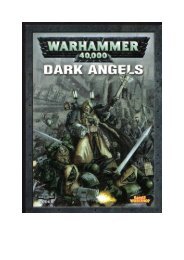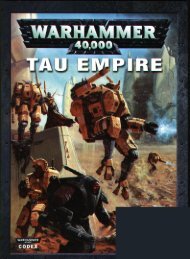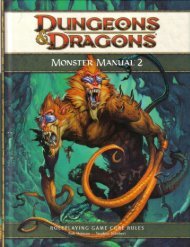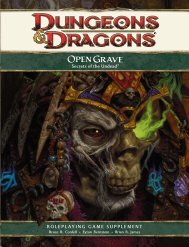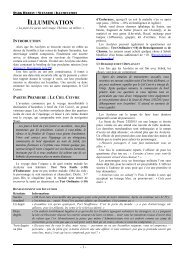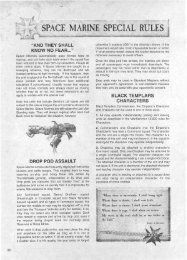Create successful ePaper yourself
Turn your PDF publications into a flip-book with our unique Google optimized e-Paper software.
Tactics: The brown dragon opens with a breathweapon and frequently takes cover behind a dune.If the PCs draw near the base of a dune, the <strong>dragons</strong>trikes the back side of the rise, causing a landslide ofsand in all squares within 10 feet of the front of thedune. The landslide is an attack, +19 vs. Reflex; ona hit, a PC is knocked prone, and immobilized (saveends). (A character must negate the immobilizedcondition before standing up.) On a miss, a PC isknocked prone. The area becomes difficult terrain.If any PCs are immobilized by the avalanche, thedragon focuses its attacks on those remaining, hopingto kill them before the others free themselves.Wildfire (Level 23): This encounter can takeplace in any place that easily burns: a dry forest, afield of grain, or an old village.Dragon: Elder red.Spreading Fires: Large swaths of the region arealready on fire. A burning square deals 10 fire damageto any character who enters it and 5 fire damage to anycharacter who begins a turn adjacent to it.Smoke: Smoke chokes the entire area, making thearea lightly obscured.Tactics: The red dragon has deliberately started thesefires, blasting various spots of this dry region. It seeks toforce the PCs into the embrace of the flames, knowingfull well that it suffers no harm while battling withinfire. If the PCs prove more of a challenge than thedragon expects, it attempts to move out of range andcontinues to spread the fire, forcing the PCs to fightthrough an ever-spreading wall of flame to escape.Rain of Terror (Level 29): Caught out in inclementweather, the PCs face more than the storm.Dragon: Ancient blue.Rain: Rain makes the area lightly obscured.Tactics: The dragon makes multiple strafing passesagainst the party, using its breath weapon when it canand its other close and area attacks when it cannot.When circling back against the wind, it does so at adistance, well out of sight of the party.Social EncountersNot every encounter with a <strong>chromatic</strong> dragon endsin bloodshed. Although some <strong>dragons</strong> just want todestroy, others engage in conversation and even negotiatewith humanoids. Intensely proud, <strong>dragons</strong> havekeen ears for genuine (-sounding) flattery. A dragon,not foolhardy, might also take the time to listen tohumanoids’ proposals involving gain without risk.It can always eat the little pests after hearing themspeak their piece.The trick to interacting with <strong>dragons</strong> is to considertheir mind-set as much as possible. Dragons thatenter into negotiations with lesser creatures keep thefollowing considerations in mind.Position of Strength: With few exceptions, <strong>dragons</strong>assume that they have better bargaining positionsthan those who approach them. Dragons believethemselves more powerful, more knowledgeable,smarter, and generally superior to anyone with whomthey interact. Negotiators who play to a dragon’s vanityand make at least a show of giving up more than theywill receive can do well. Negotiators who attempt tomake demands or to explain why a dragon needs theirhelp had better have solid arguments or quick feet.Careful Tread: Dragons negotiate carefully. Theyponder intricacies, consider ramifications, and agreeonly to actions for which they understand—or believethey understand—all possible consequences. Somepeople (outside a dragon’s earshot) might attributethis caution to fear of being duped or endangered.Dragons attribute it to wisdom. Negotiators shouldmake efforts to appear open and up front, because<strong>dragons</strong> take issue with anyone they suspect of harboringsecrets or of trying to put one over on them.The Long Term: Dragons take the long view.(This characteristic ties into their tendency toponder decisions thoroughly.) Barring violent death,a dragon expects to be around when a negotiator’sgreat-great-grandchildren die of old age. It mightaccept a seemingly poor deal if it foresees great gainsfrom the deal in the future. Alternatively, the dragonmight reject even an apparently great offer if the longtermimplications bear out an unfavorable result.Negotiators who give thought and lip service to theramifications of their proposals can earn a dragon’srespect. Those who emphasize short-term gains likelyearn derision.Sample Skill ChallengesAs in the previous section, you can use these skillchallenges in your own adventures as written or letthem inspire you to create your own encounters. Inthe encounters that follow, read each opening paragraphaloud to your group of adventurers to leadinto the encounter. You can also read the setups tothe PCs.The King’s VizierThe great double doors close behind you with a resoundingcrash. The long hall, normally full with the king’s court andadvisors, is all but empty, the benches along both sides bare.Only the royal vizier remains, in all his gleaming glory.He coils around the throne and stares at you unblinkingly.“Now . . . tell me why you haven’t left and why I shouldn’teat you for your disobedience.”The PCs hoped to gain an audience with the kingto request his assistance. Unfortunately for them,his vizier—a dragon that has advised the king andthe king’s predecessors for decades—considers thecharacters potential rivals for power. It wants themnowhere near the king and even wants to put an endto their moving about the kingdom.DRACONIC ENCOUNTERSCHAPTER 2 | DM’s Guide to Dragons47



